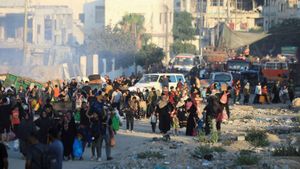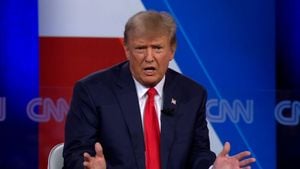Diplomatic tensions are often the forefront of international relations, and recently, several incidents have unfolded across the globe, highlighting the complex web of diplomacy and political maneuvering. From Canada to Russia, and Ukraine to Israel, these developments continue to shape the geopolitical narrative.
On November 8, 2024, the Russian Foreign Ministry summoned the deputy head of Canada's embassy to address what they termed as "false accusations" by Ottawa concerning alleged planned sabotage by Russia against NATO countries. Moscow accused Canada of conspiring with the United States, claiming these allegations were part of what they refer to as the "hybrid war" against Russia. The Russian diplomat emphasized the need for Canada to exercise prudence, warning of potential consequences from any hostile actions.
This diplomatic spat isn't occurring in isolation. Canada has been under scrutiny due to its stringent stance on alleged terrorism links related to Sikh separatists. The root of this controversy can be traced back to the killing of Hardeep Singh Nijjar, designated as a terrorist by India, which ignited accusations from Canadian Prime Minister Justin Trudeau against India, alleging its involvement. Canada condemned several acts of violence against Indian communities within its borders, showcasing the intensity of these tensions.
Meanwhile, Indian officials recently dismissed the credibility of what they labeled as fake documentation purportedly asking Indian diplomats to engage with Indian diaspora groups to confront Sikh extremists. The External Affairs Ministry firmly stated, "No such memo has been issued." This furor is compounded by recent incidents of violence against Indian diplomats and citizens on Canadian soil, calling for urgent attention from Ottawa to secure safety for its diplomats abroad.
Across the ocean, Ukrainian Foreign Minister Dmytro Kuleba offered insightful reflections on Russian diplomacy during his tenure. Kuleba, speaking about his previous meetings with Russian Foreign Minister Sergey Lavrov, suggested Lavrov was not privy to the war's prelude, claiming decisions were made by "a super narrow circle," likely excluding Lavrov himself. He argued this aligns with the perception of Lavrov's diplomatic capabilities, stating he offered solutions for humanitarian corridors during the siege of Mariupol, but faced resistance—emphasizing Lavrov's limited authority.
This backdrop reveals the intricacies inherent in such high-stakes diplomacy. The deadlock faced by diplomats during armed conflicts often lays bare the limitations and challenges of real-time negotiations. Kuleba's remarks reflect not just historical encounters with Lavrov but also the hurdles faced by diplomats when confronting entrenched conflicts.
While Ukraine deals with its own existential crisis, Israel is witnessing increased tensions amid French diplomatic endeavors. During a visit by French Foreign Minister Jean-Noël Barrot to Jerusalem, Israeli police arrested French gendarmes stationed at a French-owned compound. The incident followed significant diplomatic engagement as tensions brew over regional conflict dynamics, showcasing how domestic law enforcement can significantly intrude upon diplomatic dealings.
These incidents collectively paint a picture of the current state of international relations—a turbulent chapter where accusations flow freely, and nations are increasingly cautious of one another, often leading to unexpected confrontations. Each diplomatic incident fuels the narrative fraught with distrust and the constant struggle for national security among global powers.
From Canada's strained ties with India to Russia's serious allegations against NATO, and Ukraine's enduring confrontation with Russian aggression, the world watches with bated breath. These incidents not only impact bilateral relations but also influence broader alliances and civil constituencies, proving diplomacy and its myriad complications remain central to global stability.
Overall, the present diplomatic climate emphasizes the need for careful navigation through allegations and counter-allegations, negotiation and dialogue, especially as governments are pressured to fulfill their political responsibilities at home. The stakes for those at the helm of foreign relations have never been higher, with significant ramifications looming over issues of national integrity and international cooperation.
Yet, amid these tensions, there is hope—diplomacy remains, even if imperfect. It is through such exchanges of words, albeit accompanied by protest and anger, where potentially fruitful resolutions may surface. Each incident serves as both a warning and an opportunity for nations to reflect on their positions and search for pathways to peace.



